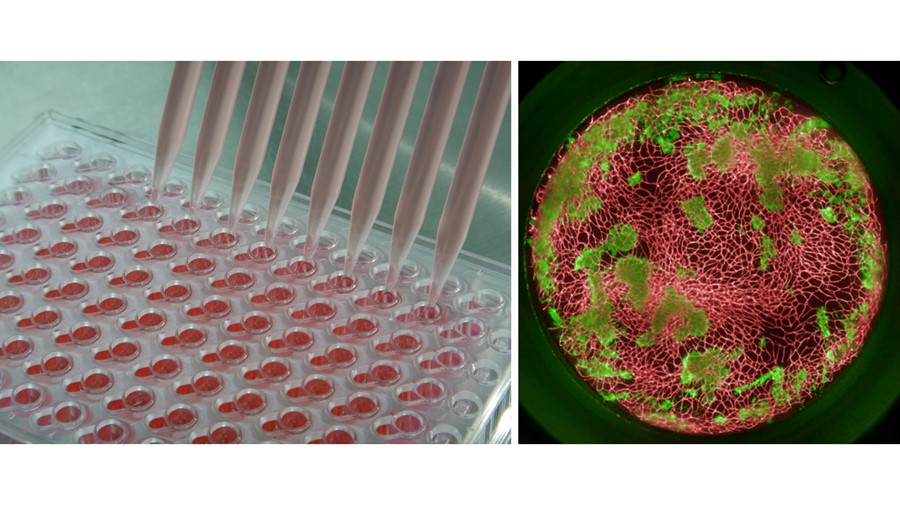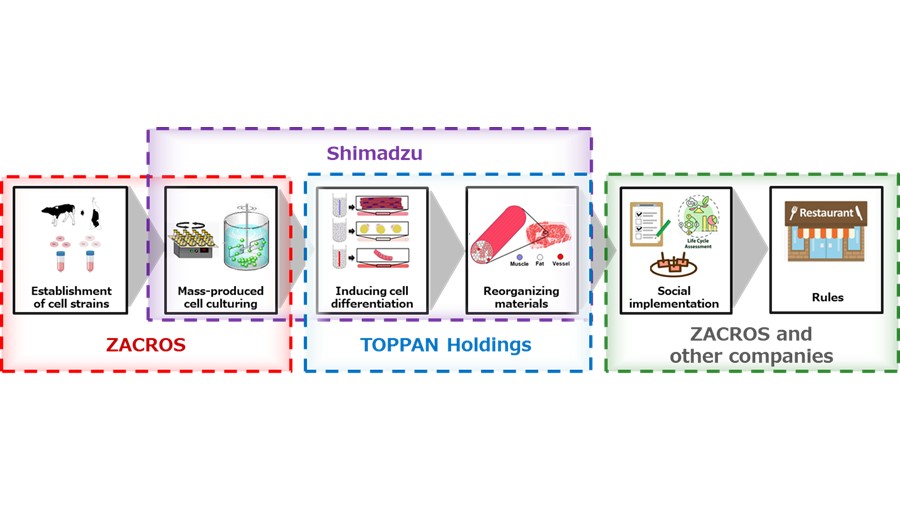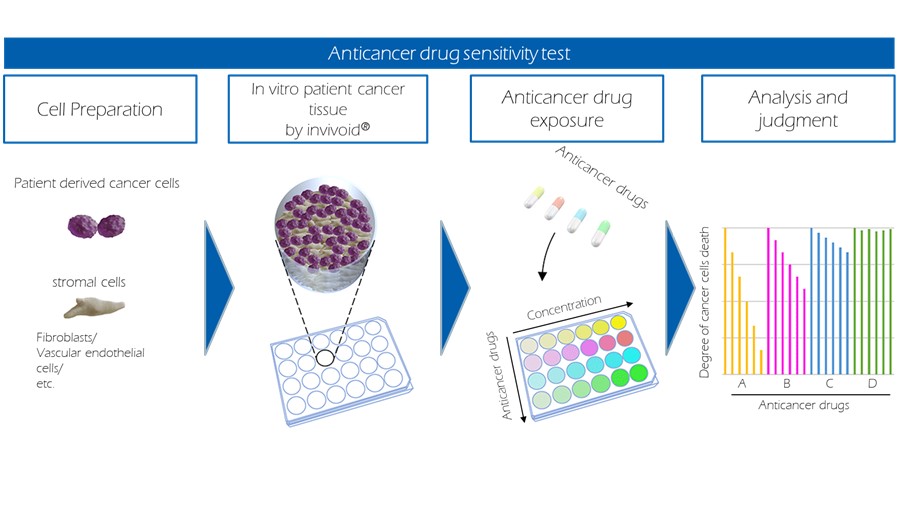Tokyo – April 19, 2024 –The Graduate School of Engineering at Osaka University (Osaka University), TOPPAN Holdings Inc. (TYO: 7911) (TOPPAN Holdings), the Food Science Institute Foundation (Ryoushoku-kenkyukai) (the Food Science Institute), and Meiji Co., Ltd. (Meiji) have jointly developed a technology to create three-dimensional mammary gland tissue with milk-like substance synthesis functionality utilizing the 3D cell culture technology invivoid™.
The 3D cell culture technology invivoid™, co-developed by Osaka University and TOPPAN Holdings, employs proprietary materials such as collagen microfibers to enable a 3D environment for cells, with cell-cell and cell-collagen interactions that can mimic those of living organisms.
Osaka University, TOPPAN Holdings, the Food Science Institute, and Meiji will utilize this newly developed technology to aim for the reconstruction of mammary gland tissue in breast cancer patients and the production of cell-cultured milk, contributing to advances in the fields of both regenerative medicine and cell-cultured foods.
The results of their efforts so far will be presented at the World Biomaterials Congress held at the EXCO exhibition and convention center in Daegu, South Korea, from May 26 to May 31.

Background
Breast cancer continues to be the most common cancer (malignant neoplasm) among women, with the number of patients increasing yearly. Advancements in medical technology have improved early detection and treatment initiation, leading to higher cure rates, but despite implants and fat cell injections being used for breast reconstruction after mastectomies, many people still face difficulties with breastfeeding due to the inability to reconstruct the mammary gland, the site of breast milk synthesis, following the mastectomy.
In response to this challenge, startup companies have recently emerged that are attempting to produce cell-cultured milk using mammary gland cells, marking how the construction of three-dimensional tissues is beginning to be considered crucial not only for medical purposes, but also in the fields of nutrition and food science.
Against this backdrop, Professor Michiya Matsusaki of Osaka University’s Graduate School of Engineering and TOPPAN Holdings jointly developed invivoid™, a 3D cell culture technology. As one example of research utilizing invivoid™, Osaka University, Kyoto Prefectural University of Medicine, and TOPPAN Holdings developed a technique in January 2022 to generate miniature breasts (approximately 900 μm) composed of adipocytes, adipose-derived stem cells, and vascular endothelial cells in a collagen microfiber scaffold.
Since January 2022, Osaka University, TOPPAN Holdings, the Food Science Institute, and Meiji have been jointly working to develop technology for in vitro creation of human mammary gland tissue capable of synthesizing milk-like substances, as well as to research and analyze the synthesized milk-like substances, leading to the development of this technology.
The four collaborating organizations will utilize the three-dimensional mammary gland tissue created with invivoid™ to aim for the reconstruction of mammary gland tissue in breast cancer patients and the production of cell-cultured milk, contributing to advances in the fields of regenerative medicine and cell-cultured foods, respectively.
Features
(1) Capable of creating mammary gland tissue with ductal structures
Mammalian mammary glands possess alveoli and ductal structures for synthesizing and transporting milk. By utilizing invivoid™, it is possible to create mammary gland tissue with these two structures.
(2) Capable of synthesizing the milk protein casein in response to hormones
Mammalian mammary gland tissue responds to hormones produced within the body to synthesize casein, one of the proteins found in milk. It has been confirmed that mammary gland tissue created with this technology also synthesizes casein in response to hormones. Furthermore, when using invivoid™, which uses collagen microfibers in 3D cell culture, it has been confirmed that the efficiency of casein production in the cultured mammary gland tissue is approximately twice that compared to methods that do not use collagen microfibers.
Roles of the four parties
Osaka University Graduate School of Engineering
Overall coordination of the research.
TOPPAN Holdings
Collaboration with Osaka University in producing mammary gland tissue using invivoid™ with collagen microfibers.
The Food Science Institute and Meiji
Analysis of milk-like substances and provision of information on milk components.
Future
Osaka University, TOPPAN Holdings, the Food Science Institute, and Meiji aim to utilize invivoid™ to develop technology for in vitro creation of mammary gland tissue capable of producing milk-like substances with a composition that more closely resembles that of human milk, thereby contributing to advances in the fields of regenerative medicine and cell-cultured foods.
About invivoid™
invivoid™ is a 3D cell culture technology using proprietary biomaterials jointly developed by TOPPAN Holdings and Professor Michiya Matsusaki of the Graduate School of Engineering at Osaka University. Because invivoid™ enables simple creation of artificial tissue that closely resembles biological tissue, it is expected to have a wide range of potential applications in fields such as personalized cancer care, drug discovery including efficacy and toxicity testing, regenerative medicine, and cell-cultured foods.
https://www.holdings.toppan.com/en/invivoid/index.html
About the World Biomaterials Congress
The World Biomaterials Congress is an international conference that disseminates the latest information and knowledge related to materials that interact with biological systems (biomaterials) across a diverse array of fields that include medicine, life sciences, and engineering.
Dates: May 26 to May 31, 2024
Venue: EXCO (Daegu, South Korea)
Official website: https://www.wbc2024.com
Theme: Convergence in Biomaterials: a vision for the future of healthcare
Organizer: WBC2024 Organizing Committee
About the TOPPAN Group
Established in Tokyo in 1900, the TOPPAN Group is a leading and diversified global provider committed to delivering sustainable, integrated solutions in fields including printing, communications, security, packaging, décor materials, electronics, and digital transformation. The TOPPAN Group’s global team of more than 50,000 employees offers optimal solutions enabled by industry-leading expertise and technologies to address the diverse challenges of every business sector and society and contribute to the achievement of shared sustainability goals.
https://www.holdings.toppan.com/en/
https://www.linkedin.com/company/toppan/



